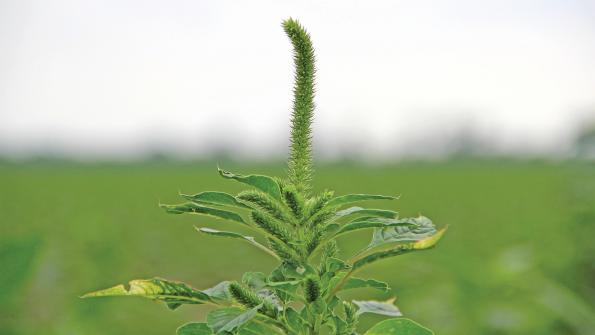June 16, 2016

This spring we have been conducting a random survey of Palmer amaranth in Tennessee to get an estimate of the frequency of PPO resistance.
With this survey, we chose fields at random and pulled 30 to 50 Palmer amaranths in each. We sent these plants to Bryan Young at Purdue University, who ran a molecular test to determine if any of the Palmer had the PPO resistance gene.
This survey is ongoing, but as of last count, 38 percent of the fields we collected Palmer amaranth from contained at least some PPO-resistant Palmer amaranth plants.
In these fields the number of resistant plants ranged anywhere from 10 to 25 percent of the population.
[CHARTBEAT:3]
Another trend from this survey is that counties along the Mississippi River had a higher probability of containing PPO-resistant Palmer than counties further east. To put it another way, it is close to a 50/50 chance that any given field from Lake County to Shelby County will contain PPO-resistant pigweed.
Obion, Gibson, Crockett, Haywood, Madison and Fayette counties have better than a 30 percent chance of a given field having at least some PPO-resistant Palmer.
The counties further east have a significantly less chance of PPO-resistant Palmer amaranth in their fields.
My main take-home from this survey is it is a good thing so many LibertyLink soybeans were planted in those west Tennessee counties. We would clearly have had many more soybean fields that would have had to have been disked up and replanted do to glyphosate and PPO-inhibiting herbicides failing to control Palmer amaranth had they been planted to Roundup Ready soybeans.
Delta Farm Press Daily
Stay current on what’s happening in Mid-South agriculture: Subscribe to Delta Farm Press Daily.
As it is, we have had a number of soybean fields with good soybean stands that have been destroyed due to Palmer amaranth escaping Sharpen as a burndown or a Prefix post application in soybean.
In a couple of these fields, we randomly sampled the escaped Palmer as well. Those escaped Palmer amaranth were anywhere from 70 to 97 percent positive for the PPO resistance gene. Those fields are now planted to LibertyLink soybeans.
We are clearly in the midst of a changing of the guard from Roundup Ready to LibertyLink technology in soybeans. Quite frankly, we have to go this route due to glyphosate and the PPO herbicides no longer controlling pigweed.
In retrospect, it would have been better to integrate both technologies five years ago and maybe PPO herbicides would still be effective.
Going forward, if labels are in hand for Engenia in Xtend soybean and Enlist Duo in Enlist crops, it makes more sense to integrate these technologies with LibertyLink than everyone going with any one technology whole hog.
You May Also Like




